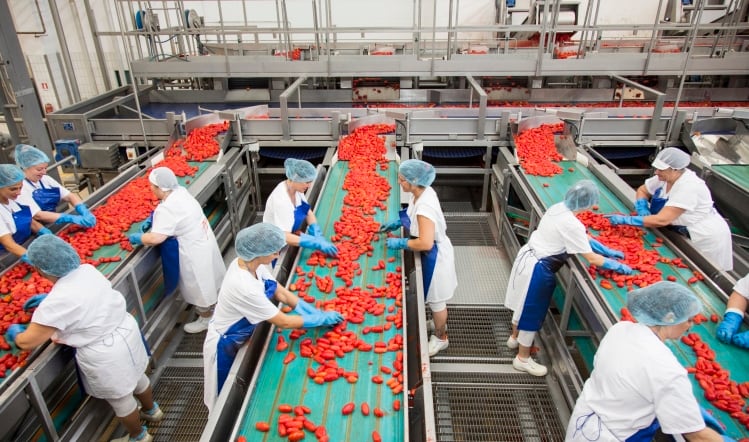For someone who hadn’t any experience in logistics prior to taking on the top job at the Food Storage & Distribution Federation (FSDF), Shane Brennan clearly has been making up for lost time.
And, having journeyed 6,000 miles to visit 34 facilities in his first 10 weeks since becoming chief executive in July, he now feels he is in a position to pause and reflect on his first impressions of the industry.
“I’ve been getting out and seeing as many of the members as I possibly can so I can understand their businesses and their issues,” Brennan explains. “I’ve been struck by just how much innovation there is and how vital the work is that our members are doing.”
While it’s evident that there’s plenty of focus on the role manufacturers and retailers play in the food supply chain, he says, those who are responsible for delivering it on time and in the right condition often don’t receive the appreciation they deserve. It’s an injustice he is intent on turning around.
Although not an expert in the food supply chain, when it comes to trade associations, Brennan is a seasoned professional. A large chunk of his working life has been spent at the Association of Convenience Stores (see box), while his last role was as director of external affairs at the Country Land & Business Association.
“One way of looking at it is that I’ve worked for the retail, the agricultural and production side [of the food industry] and now I’m filling in the middle – working for the logistics part,” he says.
Duties to the organisation
The subject matter may be different, but Brennan believes the duties of his current organisation are much like those of the ones he worked at before. The role of any trade body, he suggests, is to exist as an interface between the industry it represents and the outside world – whether that’s the media, government or other industry groups.
“It requires a specific set of skills and knowledge, and one of the advantages you have – if you’re not from the industry – is that you can help it to understand how it’s viewed from the outside. This is very important when you are trying to influence and make an impact,” Brennan explains.
“Associations are also there to create opportunities for people in the industry – for them to come together and work on common problems, learn from each other, and create a sense of community.”
With all its challenges, some might question why Brennan would want to become a champion of the
food logistics sector. But for him, it’s the chance to shine the spotlight on an industry whose achievements are often overlooked by the public at large.
“There’s a lot of attention on what the manufacturers and retailers are doing, but those who are making sure the stuff arrives on shelves, on time and in the condition they need to be in are a largely forgotten part of the story,” he argues.
“What’s really intriguing to me is the chance to offer that voice and make sure the solutions our members provide are properly accounted for by government and by those further up the supply chain.”
Raising cold storage’s profile
Central to raising the profile of the cold storage and distribution sector is the need to address criticisms around the supposed lack of innovation those who operate within it bring to the table.
A recent survey by supply chain consultancy Scala found that 76% of respondents – made up of directors and managers from retailers, manufacturers, technology providers and logistics providers themselves – felt it was a problem.
However, Brennan is adamant this couldn’t be further from the truth. “What I’m struck by is the amount of innovation, investment and general optimism there is in regard to developing the sector,” he says.
“While I think every part of the market is performing well and doing things in very different ways, the main thing that has stuck with me is the amount of forward-thinking I’ve seen from our members.”
Perceived problemsIn talking with FSDF members, Brennan has also come to learn the real challenges facing the industry and what is keeping the logistics providers and warehouse operators up at night. Surprisingly, Brexit wasn’t high on the list of concerns and was often seen in a less negative light than the rest of the food and drink industry.
“Our members are in a pretty strong place and will be able to cope and be able to adapt to the changing environment [Brexit] will create,” says Brennan. “If anything, it’s had a positive impact on people’s awareness and value they put on logistics.”
FSDF’s concerns
So if not Brexit, what is the major concern for FSDF members? According to Brennan, it is issues surrounding vehicle emissions and climate change that top their list of worries.
“A lot of focus over a number of years now has been on the cost of energy and its use in the refrigerated supply chain. The industry has done a huge amount over a number of years to reduce emissions and make more the processes and the equipment they use more efficient. Pressure continues to mount in those areas and the issues around it.
“My job is to make sure that the people setting these policies understand the value and importance of the cold supply chain in the bigger picture, in reducing waste and ensuring we are efficient. In the medium term, this is probably sitting above Brexit in terms of its business implications.”
Also front of many people minds, especially with the threat of Brexit scaring away foreign workers from UK shores, is the use of automation. Many big warehouses, especially the ones owned by major players like Amazon, now use automation on a grand scale. Brennan, however, doesn’t see what the fuss is about.
“Automation has a vital role to play, but it isn’t the silver bullet – not the total solution for everyone. Given the nature of our market and diverse customer base our members are servicing, automation is part of the solution but not the complete answer.”
No matter the challenges faced by cold storage and distribution providers in the future, it’s clear that, in Brennan, the sector has a boss fully prepared to face them head-on.
Shane Brennan
Job title: Food Storage & Distribution Federation (FSDF) chief executive
Age: 39
Domestics: Married with two daughters.
CV: Having graduated from the University of Warwick in 2001, Brennan worked as public affairs executive at the Association of Convenience Stores. He returned to the organisation in 2007 after a stint as board director at the Community Alcohol Partnership. In 2014, Brennan became director of external affairs at Country Land & Business Association before joining the FSDF in July.
Away from work: Brennan is a devoted supporter of Bristol City. His wife’s Mauritian heritage means he has become a fan of the nation’s cuisine.




